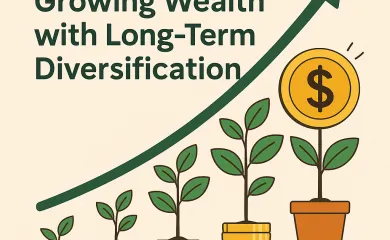5 Portfolio Mistakes That Are Silently Draining Your Retirement Wealth

In today's volatile economic landscape, ensuring your portfolio is optimized for retirement is more crucial than ever. Recent studies have shown that nearly 50% of retirees are concerned about outliving their savings. This fear isn't unfounded, as many portfolios are silently bleeding wealth due to common but often overlooked mistakes. In this article, we'll delve into five critical missteps that could be undermining your retirement plans. By understanding and addressing these issues, you can secure your financial future and enjoy a stress-free retirement.
Overlooking Diversification
Diversification is the bedrock of a robust investment strategy. Yet, many investors unknowingly concentrate their assets in a few sectors or stocks. This lack of diversification can expose your portfolio to significant risks. For example, the tech bubble burst in the early 2000s left many investors devastated because they had heavily invested in technology stocks without adequate diversification. Diversifying your portfolio doesn't just mean spreading investments across various stocks, but also considering different asset classes like bonds, real estate, and commodities. This approach helps mitigate risks and ensures a more stable growth trajectory for your retirement savings.
Ignoring Inflation
Inflation is the silent killer of purchasing power. If your investments don't outpace inflation, your retirement savings could lose significant value over time. For instance, if inflation averages 3% annually, a retirement fund worth $1 million today would need to grow to approximately $1.34 million in 10 years just to maintain its purchasing power. Investing in assets that traditionally outpace inflation, such as equities or inflation-protected securities, is crucial. While these investments carry their own risks, they offer a hedge against inflation's erosive effects on your retirement wealth.
Emotional Decision-Making
Emotions can be an investor's worst enemy. Market volatility often triggers fear-based decisions, such as panic selling during a downturn or buying into a market bubble. These emotional reactions can lead to significant financial losses and derail your retirement plans. A well-defined investment strategy and a disciplined approach can help mitigate emotional decision-making. Sticking to your plan, even during turbulent times, and consulting with a financial advisor can provide the stability and objectivity needed to make sound investment choices.
“The stock market is filled with individuals who know the price of everything, but the value of nothing.” — Philip Fisher
Neglecting Rebalancing
Portfolio rebalancing is a critical yet often neglected practice. Over time, market fluctuations can skew your asset allocation away from your intended strategy, increasing risk exposure. For example, if equities outperform bonds, your portfolio may become overly weighted in stocks, which could be risky as you approach retirement. Regularly reviewing and adjusting your asset allocation keeps your portfolio aligned with your risk tolerance and financial goals. Rebalancing ensures that your investments remain diversified and that you are not overexposed to any single asset class.
Underestimating Fees and Costs
Investment fees and costs can significantly erode your returns over time. Many investors are unaware of the impact that seemingly small fees can have on their overall wealth. According to a study by the Securities and Exchange Commission, a 1% annual fee can reduce an investor's portfolio value by nearly $30,000 over 20 years on a $100,000 investment. Being mindful of fees and seeking low-cost investment options, such as index funds or ETFs, can enhance your portfolio's growth potential. Always review the fee structure of your investments and consider the long-term impact on your retirement savings.
In conclusion, safeguarding your retirement wealth requires vigilance and proactive management. By diversifying your portfolio, accounting for inflation, avoiding emotional decisions, rebalancing regularly, and minimizing fees, you can protect and grow your retirement savings. Remember, the key to a successful retirement is not just accumulating wealth but ensuring that it lasts. Take control of your financial future today by addressing these common portfolio mistakes and enjoy the peace of mind that comes with a secure retirement.



